 A couple of consultants from Elanco Animal Health have moved up in ranks. Dr. Bill Platter oversees consultants for beef cattle and Dr. Bill Mies is Elanco’s latest beef consultant.
A couple of consultants from Elanco Animal Health have moved up in ranks. Dr. Bill Platter oversees consultants for beef cattle and Dr. Bill Mies is Elanco’s latest beef consultant.
Elanco Animal Health has announced the promotion of Dr. Bill Platter to the position of manager of technical consultants for beef cattle. In this role he will lead a team of professionals conducting post-product-approval research, and providing technical services with a feedlot and stocker focus in the United States. These activities focus on work with veterinarians, nutritionists and meat scientists to improve animal health, production efficiencies and profitability within the beef industry.
Platter has relocated to work from Elanco’s global headquarters in Greenfield, Ind.
Most recently, Platter served as a technical consultant supporting the Elanco cattle business unit’s food-chain initiatives, based first in Greenfield and then in the Midwest.
Elanco Animal Health has also announced the hiring of Dr. Bill Mies as a beef feedlot consultant – global beef group. In this role he will work with Elanco’s marketing-and-sales teams, providing technical support to feedlots in North America and other locations throughout the world. Mies will work from his home office in College Station, Texas.


 Cindy and I have had a very relaxing stay in Sendai the past two days. We’ve wandered around town, including the Sun Mall Ichibancho. It’s a big shopping mall that goes on for blocks in every direction.
Cindy and I have had a very relaxing stay in Sendai the past two days. We’ve wandered around town, including the Sun Mall Ichibancho. It’s a big shopping mall that goes on for blocks in every direction.
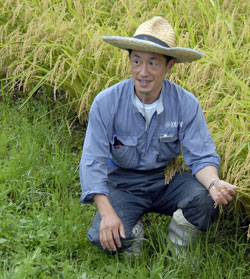 This is one of the workers at the Furukawa Agricultural Research Center. He was posing for us ag journalists so I’ve got to post him for you.
This is one of the workers at the Furukawa Agricultural Research Center. He was posing for us ag journalists so I’ve got to post him for you.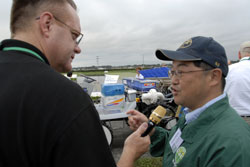 Precision agriculture is hitting the rice industry in Japan. At least it’s in R&D now at the
Precision agriculture is hitting the rice industry in Japan. At least it’s in R&D now at the 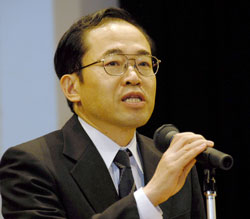 During our visit to the Tokyo University of Agriculture we attended a press conference with Mr. Masanori Sato, Director General in charge of International Affairs, Japan Ministry of Agriculture.
During our visit to the Tokyo University of Agriculture we attended a press conference with Mr. Masanori Sato, Director General in charge of International Affairs, Japan Ministry of Agriculture. 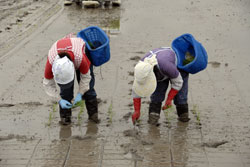 This is the way people have transplanted rice into paddies for who knows how long. That’s changed a lot now that machinery has been built to make the task much easier and faster.
This is the way people have transplanted rice into paddies for who knows how long. That’s changed a lot now that machinery has been built to make the task much easier and faster.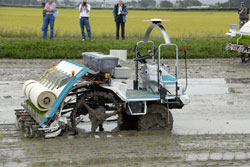 We got to watch a demonstration of a machine with a man at the wheel but the main attraction was a prototype of a new GPS-guided planter. I’ll have more on that in another post.
We got to watch a demonstration of a machine with a man at the wheel but the main attraction was a prototype of a new GPS-guided planter. I’ll have more on that in another post. We moved on from Tokyo to Sendai via Furukawa on Wednesday. Moving a couple hundred people through a crowded train station is not an easy task. The Japanese journalists helped out though by stationing themselves at various places with signs pointing us to the right track.
We moved on from Tokyo to Sendai via Furukawa on Wednesday. Moving a couple hundred people through a crowded train station is not an easy task. The Japanese journalists helped out though by stationing themselves at various places with signs pointing us to the right track.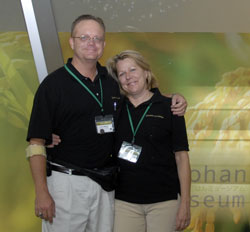 To help demonstrate how import rice is to the Japanese culture we visited the
To help demonstrate how import rice is to the Japanese culture we visited the 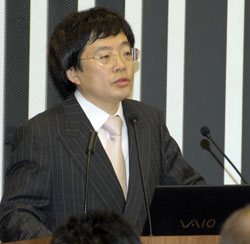 When you attend these IFAJ conventions it’s interesting to hear from the policy leaders on the program. I’ve found that it’s very normal to have someone on the program to defend policy practices, especially when it comes to foreign trade and the WTO.
When you attend these IFAJ conventions it’s interesting to hear from the policy leaders on the program. I’ve found that it’s very normal to have someone on the program to defend policy practices, especially when it comes to foreign trade and the WTO.